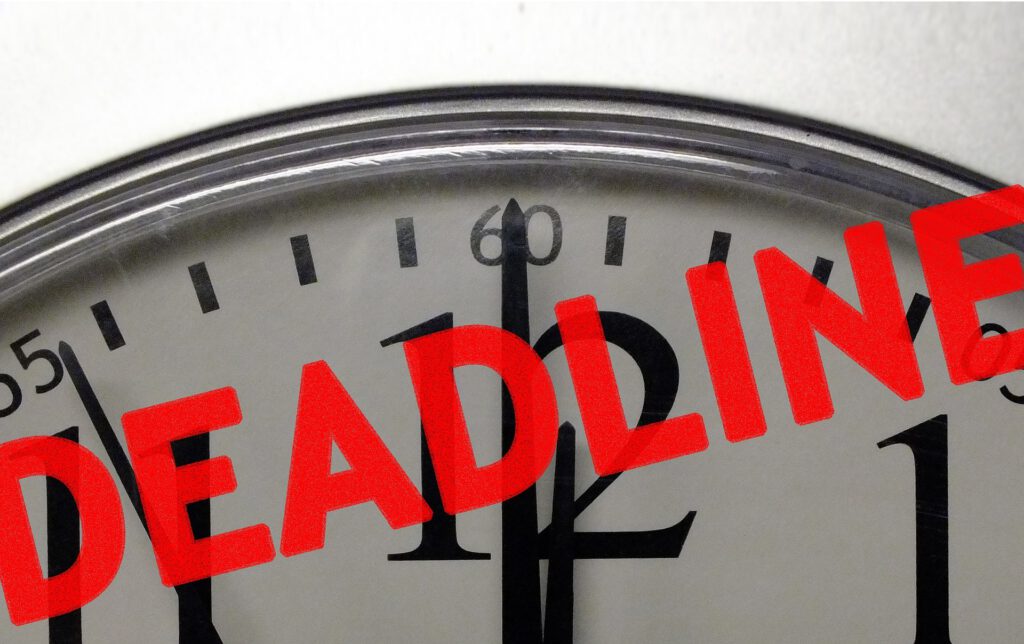Need to write your 10,000 word thesis in 2 weeks? Oh dear! Well, let’s quickly figure out a solution.
Since you don’t have much time, the next 15 minutes of reading should be enough.
In this video, you’ll get personal emergency coaching consisting of 7 steps.
If you follow these steps one after the other in the given time, you still have a chance to submit your thesis in 2 weeks without failing.
Disclaimer Before we start, here’s a 10-second disclaimer:
I would never, ever recommend letting it come to this. If you’re only giving yourself 2 weeks for your thesis or final paper, you’ll have your reasons. These reasons are none of my business and are entirely your own.
If your goal is to excel intellectually in your thesis and get a top grade, then this video is not for you—in that case, you should check out my other tutorials.
This article is for you if you just want to get your thesis onto paper as quickly as possible—and pass.
So, let’s get to work.
#1 Lower Expectations and Drastically Increase Priority
The first question that comes to mind in such a situation is this:
Is it even possible to write a 10,000 word thesis in 2 weeks?
Of course, it’s possible.
It is even possible without any dirty tricks, plagiarism, or a Red Bull poisoning.
But only under certain conditions.
Lower Your Expectations to Zero
The first condition is to accept the situation and eliminate your expectations of a good grade or anything else. Approach the situation stoically and do your best to show yourself that you don’t give up.
That you don’t throw in the towel but make the best of the situation.
Visualize that you fail this thesis and accept that too.
This shouldn’t lead you to half-hearted action in the 2 weeks you have left. Rather, these 2 weeks are your chance to take on the challenge.
Now you can intensively train how to write a thesis in 2 weeks.
And if a second attempt comes, you won’t have to start from scratch.
Treat Your Thesis as Priority Number 1
Whether you can write a thesis in 2 weeks doesn’t depend on whether you can write well or are blessed with other talents. What decides now is your time management.
If you don’t make your thesis your top priority, it will be very difficult.
If you really want a chance, then your thesis must be the only thing you focus on now.
(Besides your health, but more on that later)
Make a contract with yourself and signal to your environment that you will be unavailable for a short time as usual. Put your phone in the fridge in the morning and don’t get it out until after work.
(Please don’t actually put it in the fridge, put it in a drawer.)
#2 Your Research Strategy for a Thesis in 2 Weeks
Enough of the admonishing words, now let’s move on to the substantive strategy for your daring venture.
The first strategic decision you must make concerns your research strategy.
What do I mean by that?
Basically, your research question and the method you want to use to address it.
Scientific papers in social sciences, but also beyond, can be divided into empirical and non-empirical works.
Why No Empirical Thesis?
For an empirical research design, you need qualitative or quantitative data that you collect through a survey or interviews and then analyze.
I would advise you, if you can make this decision yourself, to not pursue an empirical research design in this situation.
Not because it’s more difficult or time-consuming than a conceptual or literature-based work.
The reason is that you depend on other people.
You need to get people to fill out your survey or give you an interview.
Any situation in which you rely on others should be avoided if you want to write a thesis in 2 weeks.
Last Resort: A Literature-Based Thesis?
The only scenario in which an empirical research design makes sense is if you have already collected the data or have been provided with it.
Or any other case where you completely control the implementation of your methods, such as a simulation.

So, ask yourself what dependencies you have in your strategy and eliminate them all.
If you don’t have data available, you’re left with a literature-based thesis.
You can write a review for which you collect your “data” in the form of scientific articles.
The good thing about it is that you can decide for yourself how quickly you get your literature.
What types of reviews there are and what the literature collection looks like, you’ll learn in my tutorial on how to write a literature review.
Not all supervisers would expect you to write a critical review or a systematic review in a 10,000 word thesis.
Your thesis can also address a research question that you answer with an unstructured analysis of literature.
However, I would recommend choosing a recognized review strategy and implementing it step-by-step.
The advantage is that you can refer to one or two methodology articles that explain exactly how to proceed.
All you have to do is follow the instructions.
So you don’t have to waste thoughts on how to structure your thesis or what your research question should look like.
Everything is predetermined, and you save valuable time and energy.
If you choose the research strategy of a standalone literature review, you don’t need to feel bad about writing a thesis that is less valuable than an empirical one.
The synthesis of literature is an important part of scientific practice and can lead to great results!
#3 Set Up a Work Plan to Write Your Thesis in 2 Weeks
The next step in your emergency plan is a strict time allocation. Since every minute counts, you must work with sharp deadlines that you keep for yourself.
To not make it unnecessarily complicated, I suggest dividing the remaining time into three equal thirds.

1. Data Collection (first third)
2. Data Analysis (second third)
3. Text Production (third third)
Assuming you have 2 weeks available, you have 4 days and a few hours per third. Set the deadline for each third in the calendar and stick to it.
This way, you also have a sense of achievement every 4 days that motivates you to keep going.
Now let’s focus on each specific third and what you need to do.
#4 Data Collection (First Third)
For simplicity, let’s assume you’ve chosen a systematic literature review as your research approach.
Literature Search & Screening (Day 1)
On this day, your goal is to gather all the literature you need. Define your search key words and databases and try to land somewhere between 100 and 500 hits.
Once you’ve collected all the hits based on your keywords, the screening follows in the second half of the day. Now read the titles and abstracts and sort out.
If you end up somewhere between 20 and 30 relevant articles, that’s OK.
If you’re below that, keep searching through forward and backward search. You’ll learn what that is in my other tutorial on literature reviews.
Read, Read, Read (Day 2 and Day 3)
Now make yourself comfortable somewhere where you’re undisturbed and read your 20-30 relevant articles.
No one said you can’t have fun with your turbo thesis. So go to your favorite place and start reading. You can’t get around reading. Because without input, no output. The more you read on these days, the easier text production will be later on.
Collect text passages for indirect and direct quotes in an excerpt table.
How to set it up, you’ll learn in my tutorial on how to write an excerpt, where you also get a template for a table to start with right away.
Literature Management (Day 4)
Load all your relevant articles into your literature management tool (e.g., Mendeley or Zotero) and check if all metadata are correctly entered.
If not, supplement them for each article. If you have additional literature that you already know from your studies, add it and check the meta data of those.
If your thesis has about plus or minus 10% as many references as pages required, then you’re in a good range regarding the length of your reference list.
For a literature review, you can rather assume plus 10%.
Don’t skip the steps with literature management, because at the end of text production, you can generate your bibliography with one click and save valuable time.
If you still have time left, continue reading your 20-30 relevant articles.

#5 Data Analysis (Second Third)
The next 4 days you’ll be busy with data analysis. You’re preparing everything for the results and discussion section of your thesis here.
Analysis (Day 5-7)
For a qualitative evaluation of literature, as is the case with a most review types, the analysis mainly consists of coding.
This is nothing more than forming abstract categories based on your material, which consists of your 20-30 relevant articles. You can find plenty of tutorials on coding techniques on my channel.
The goal now is to form categories that summarize the contents of all your relevant articles. That’s now your task.
No matter which method you follow, empirical, literature-based, programming, design science – watch how the pros do it and follow their structure.
Scientific papers always follow the same blueprint. You just need to recognize the blueprint that is right for your thesis, adopt it, and fill it with your own content.
It’s not necessary to reinvent the wheel. On the contrary: Your supervisors want to recognize a blueprint that is common in their research discipline.
Creating Figures and Tables (Day 8)
Create a figure for your methodology section that reflects your data collection.
In the findings section, add tables that summarize your literature analysis.
For the discussion section, add a table or figure that abstracts your results (which are the categories you have built) and provide a small theoretical contribution (e.g., organize the categories in a small framework).
Again, I can only recommend that you take an example from existing research papers.
It is important that you create all your figures yourself and insert them in high resolution into your thesis. No pixels!
Detailed tutorials on writing methodology chapters, a findings and discussion section can be found on my channel or my online course.
Check out the video description for more info.
#6 Text Production (Third Third)
The last third is dedicated to text production. Don’t be intimidated by the fact that you haven’t written anything yet.
In the first and second thirds, you laid the foundation for what you’re writing about. If you start writing on day 1, you write into the blue without knowing where the journey is going.
Normally, I would recommend not starting with the introduction. In this case, however, you have already done all the preliminary work and can “write from the top.”
Open your literature management software and your excerpts from the first third and get started.
- Introduction and Background Section (Day 9)
- Methodology and Findings (Day 10)
- Discussion and Conclusion (Day 11)
- Revision (Day 12)
On day 12, you start again with the introduction and revise all chapters so that they are linked to each other.
Use the same terms, add references where you need more evidence, and check where you can make grammar improvements.
If you’ve been counting, this emergency plan leaves 2 days left.
At least one day is a buffer for formatting. After all, you still have to create your reference list, maybe an appendix, proofread and print your work, prepare a digital submission, and so on.
The last remaining day is your joker. Save it as long as possible and use it for unforeseen emergencies that are more important than this stupid thesis.
If everything goes well and you still have the joker day after completing the second third, then use it for a break. Which brings us to the last point of the video.
#7 Mental and Physical Health Management
As stressful as it may sound to want to write a thesis in 2 weeks – a 10,000 word thesis is by no means more important than your health.
You can simply write it again and failing is not bad at all. Who cares?
Only go through such a sprint, as I have described it, if you feel physically and mentally fit. If you’re already at your limit, then listen to your body and don’t make it worse.
Your health always has priority number 1, because if it’s out of balance, then you won’t enjoy a passed thesis anyway.
Since this emergency plan requires full days of work, I recommend planning them intelligently.
Work with 90-minute deep work sessions and take breaks in between.
In the middle of the day, I recommend a longer break. Go running or to go to the gym – after that you can continue fresh.
In the evening, set a limit that you don’t exceed. So that you still have enough time to wind down and don’t get less than 8 hours of sleep.
Try not to rely too much on junk food and caffeine, but on food that supplies your brain as best as possible.
Over a period of 2 weeks, it makes a big difference what fuel you give your body.
And now stop procrastinating and get started – time is ticking!
